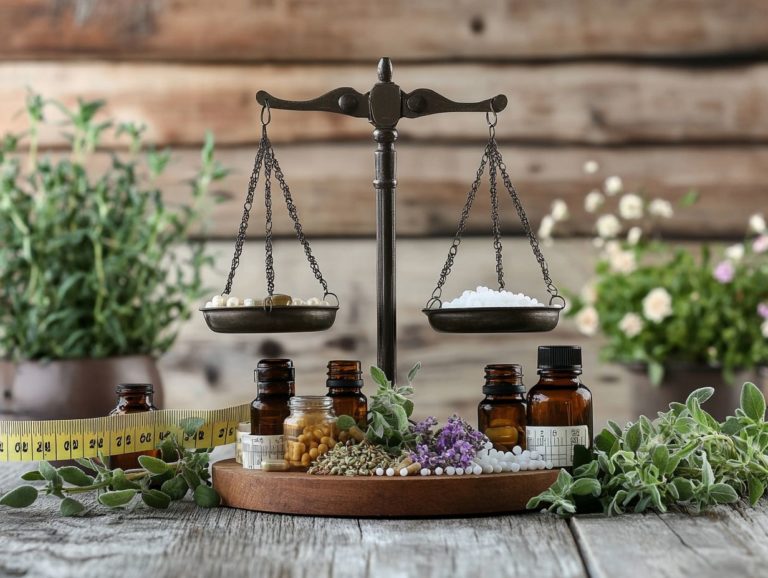Homeopathy for Seasonal Affective Disorder
Seasonal Affective Disorder (SAD) impacts numerous individuals, particularly during the darker months. It can lead to feelings of sadness and lethargy.
It’s essential to understand its symptoms and causes to manage it effectively. While you’re likely aware of traditional treatments like medications and therapy, homeopathy presents a distinctive approach to healing that deserves your attention.
Discover the exciting principles of homeopathy that can help you! This article evaluates its effectiveness for SAD, highlights common remedies, and offers insights on how to integrate it into your existing treatment plan.
You will gain a holistic perspective on addressing this condition and take proactive steps toward your well-being.
Contents
- Key Takeaways:
- Understanding Seasonal Affective Disorder (SAD)
- Traditional Treatments for SAD
- What is Homeopathy?
- Effectiveness of Homeopathy for SAD
- Common Homeopathic Remedies for SAD
- How to Incorporate Homeopathy into Your Treatment Plan
- Frequently Asked Questions
- What is Seasonal Affective Disorder (SAD)?
- How can homeopathy help with Seasonal Affective Disorder?
- What are some common homeopathic remedies for SAD?
- Is homeopathy safe for treating Seasonal Affective Disorder?
- How long does it take for homeopathic treatment to work for SAD?
- Can homeopathy prevent Seasonal Affective Disorder from recurring?
Key Takeaways:

Homeopathy can offer a natural and holistic approach to managing Seasonal Affective Disorder (SAD).
Consult with a homeopathic practitioner to find the best treatment for you.
Combining homeopathy with traditional treatments may lead to more effective results for managing SAD symptoms.
Understanding Seasonal Affective Disorder (SAD)
Seasonal Affective Disorder, often known as SAD, is a form of depression that arises with the changing seasons, particularly during autumn and winter when daylight hours dwindle.
This condition can create profound emotional turmoil, influencing mental health and overall well-being. You may experience symptoms such as grief, heightened anxiety, and lingering sadness that can disrupt your daily life.
Understanding SAD is essential for effective management, especially as it intertwines with seasonal shifts and the emotional responses they evoke.
Symptoms and Causes
The symptoms of Seasonal Affective Disorder (SAD) can vary widely. You might commonly find yourself grappling with feelings of depression, anxiety, fatigue, and changes in sleep patterns.
You may also notice a sense of hopelessness, difficulty concentrating, and increased irritability. These emotional challenges can take a significant toll on your mental well-being, often leading to a reduced quality of life.
The underlying causes of SAD are multifaceted. Biological factors, such as altered melatonin production and your body’s natural circadian rhythms, play crucial roles. Reduced exposure to sunlight during the shorter autumn and winter days can amplify symptoms, affecting serotonin levels and disrupting sleep cycles.
All these factors create an overwhelming sense of imbalance, prompting many, including yourself, to explore effective strategies for managing emotional health.
Traditional Treatments for SAD
Traditional treatments for Seasonal Affective Disorder (SAD) usually involve a blend of medications, therapy options, and lifestyle adjustments designed to ease symptoms and enhance mental well-being.
One prominent method is light therapy, which employs specialized lamps that mimic natural sunlight. This aids in the regulation of mood and sleep patterns disrupted by seasonal shifts.
You might also consider antidepressants and cognitive-behavioral therapy (CBT), a type of talk therapy that helps change negative thought patterns; both have demonstrated effectiveness in managing the symptoms of SAD.
Medications and Therapy Options
Medications for Seasonal Affective Disorder (SAD) often include antidepressants like SSRIs, which target the chemical imbalances in the brain behind depression. These medications are designed to boost serotonin levels, helping to alleviate symptoms and enhance your mood.
It s important to understand that responses to these treatments can vary significantly. You might find that alternatives like SNRIs or even mood stabilizers work better for you. While these medications can offer relief, they may come with side effects such as weight gain, insomnia, or sexual dysfunction.
Therefore, integrating therapy, particularly cognitive-behavioral therapy (CBT), can be incredibly beneficial. A holistic approach that combines medication and therapy not only tackles specific symptoms but also equips you with valuable coping strategies, ultimately enhancing your long-term well-being and resilience during those dreary winter months.
Don’t let SAD control your life! Explore homeopathy today and take the first step toward feeling better.
What is Homeopathy?

Homeopathy is a sophisticated holistic healing system based on the idea that “like cures like.” This intriguing concept suggests that substances capable of inducing symptoms in healthy individuals can, when diluted, effectively treat similar ailments in those who are unwell.
Principles and Approach to Healing
The principles of homeopathy center on individualized treatment. It invites you to view the patient as a whole rather than merely addressing symptoms. This holistic approach cultivates a more comprehensive path to healing.
It recognizes that your emotional and physical state is uniquely yours, requiring remedies that resonate deeply with your specific needs. By considering factors such as your lifestyle, emotional well-being, and personal history, homeopathy seeks to restore balance in both mind and body.
Consider common remedies like Arsenicum album for anxiety or Ignatia for grief. These illustrate how precise treatments can foster profound emotional healing.
Through this integrative perspective, you can discover an enhanced sense of well-being. It highlights the significant impact that personalized healing approaches can have on your overall emotional health.
Effectiveness of Homeopathy for SAD
The effectiveness of homeopathy in treating Seasonal Affective Disorder (SAD) has captured the attention of both practitioners and patients alike.
Numerous studies have illuminated its potential benefits, revealing how it may alleviate symptoms and significantly enhance your overall emotional well-being.
Evidence and Studies
Several studies have explored the role of homeopathy in treating Seasonal Affective Disorder, often revealing encouraging outcomes in symptom reduction and overall mental health enhancement.
Many clinical trials have used rigorous methods, including randomized controlled designs and meta-analyses, to evaluate the effectiveness of various homeopathic remedies. These studies involved diverse participant groups, providing a comprehensive understanding of the treatment’s impact across different demographics.
The results offer valuable insights for patients considering alternative treatment options. This suggests that homeopathy could serve as a viable complement to conventional therapies. By emphasizing individualized care tailored to specific symptoms, these findings underscore the potential benefits of integrating homeopathy into mental health support strategies.
Common Homeopathic Remedies for SAD
Common homeopathic remedies for Seasonal Affective Disorder (SAD) include distinct substances such as Colchicum autumnale, Natrum Mur, and Lachesis muta.
Each remedy is carefully selected according to your unique symptoms and emotional states, ensuring a personalized approach to your well-being.
Specific Herbs and Supplements

Along with traditional homeopathic remedies, you might find that certain herbs and supplements can significantly support your efforts in managing Seasonal Affective Disorder, enhancing both your emotional and mental well-being.
For instance, St. John s Wort often steals the spotlight for its mood-lifting properties, making it a go-to option for anyone seeking relief during those darker months. Similarly, Omega-3 fatty acids, commonly found in fish oil, can play a crucial role in boosting your emotional health and cognitive function, potentially counteracting the effects of reduced sunlight.
The adaptogenic herb Rhodiola rosea could also be your ally, helping you build resilience against stress and fostering a sense of calm during those seasonal transitions.
Each of these natural remedies has been researched for their unique benefits. You might be amazed at how impactful these options can be as you strive to maintain a balanced state of mind throughout the changing seasons.
How to Incorporate Homeopathy into Your Treatment Plan
Incorporating homeopathy into your treatment plan for Seasonal Affective Disorder (SAD) requires a solid grasp of homeopathic principles and the wisdom of a qualified practitioner.
This thoughtful approach can enhance your healing journey, ensuring you navigate the nuances of homeopathy with confidence and care. Don t wait! Start your journey with homeopathy today.
Consulting with a Homeopathic Practitioner
Consulting with a homeopathic practitioner is crucial for effectively tackling Seasonal Affective Disorder (SAD). They ll customize remedies that align with your symptoms and emotional states.
During your consultation, expect a thorough assessment that covers your emotional and physical symptoms, lifestyle choices, and past treatments. This whole-person approach helps the practitioner uncover key insights into your unique experience with SAD.
With this information, they ll create a personalized treatment plan that includes specific homeopathic remedies aimed at addressing underlying imbalances. Practitioners also provide guidance on lifestyle changes and self-care strategies to enhance your overall well-being, making your journey toward emotional balance achievable and transformative.
Combining Homeopathy with Traditional Treatments
Combining homeopathy with traditional treatments for SAD can significantly improve your mental health outcomes, offering a more comprehensive healing approach.
This integrative method doesn’t just address SAD symptoms like fatigue, irritability, and low mood; it also explores emotional and psychological factors contributing to the disorder. By incorporating natural remedies tailored to your symptoms, you might find greater relief and stability.
This synergy between homeopathy and conventional therapies can reduce reliance on medications, helping to minimize side effects. Collaborating closely with healthcare providers to create personalized treatment plans, along with lifestyle changes like light therapy exposure to bright light to improve mood and regular exercise, paves the way for improved mental well-being.
Frequently Asked Questions
What is Seasonal Affective Disorder (SAD)?

Seasonal Affective Disorder (SAD) is a type of depression that typically occurs during the fall and winter months when there is less natural sunlight. It is also known as winter depression or seasonal depression.
How can homeopathy help with Seasonal Affective Disorder?
Homeopathy is a natural and whole-person approach to healing that focuses on addressing the root causes of SAD. It can alleviate symptoms such as low mood, fatigue, and changes in appetite and sleep patterns.
What are some common homeopathic remedies for SAD?
Common homeopathic remedies for SAD include Aurum Metallicum, Natrum Muriaticum, and Pulsatilla. Each remedy is selected based on individual symptoms and emotional states.
Is homeopathy safe for treating Seasonal Affective Disorder?
Yes, homeopathy is a safe and gentle treatment with no known side effects. It can be used alongside conventional treatments for SAD, but consulting a qualified homeopath is important for proper guidance.
How long does it take for homeopathic treatment to work for SAD?
The time it takes for homeopathic treatment to work for SAD varies by individual. Some may find relief within a few weeks, while others might take longer. Patience and consistency with treatment yield the best results.
Can homeopathy prevent Seasonal Affective Disorder from recurring?
Yes, homeopathy can help prevent SAD from returning by addressing underlying imbalances in the body. It also strengthens the body s natural defenses, making it less susceptible to seasonal changes.
For more personalized information, consider consulting a homeopath or exploring additional resources on Seasonal Affective Disorder.






